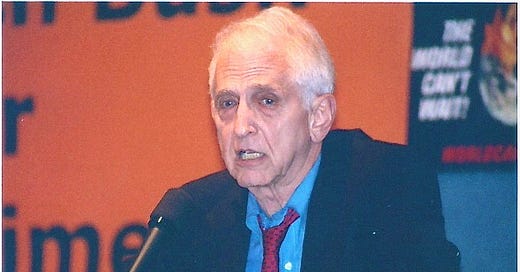The Case for Whistle-blowing
Daniel Ellsberg, National Press Club speech challenging a new generation of whistleblowers to come forward
(Caption: Daniel Ellsberg, National Press Club speech challenging a new generation of whistleblowers to come forward and calling on the new Democratic Congress to end wars in Iraq, Afghanistan, Pakistan; avoid war with Iran; and impeach Bush/Cheney (Jan. 4, 2007) - Photo Bill Wolfe)
I just learned of Daniel Ellsberg’s cancer diagnosis and read his beautiful letter.
The man is a hero and a role model of mine. He had a huge influence on my life.
So, in tribute, today I repost this January 6, 2012 post “The Case For Whistle-blowing” which is based on Ellsberg’s Jan. 4, 2007 talk I attended at the National Press Club, and 2012 remarks about Bradley Manning, which I concluded with:
Obviously, there are far more important things in life than a job.
The Case for Whistle-blowing
January 6th, 2012 Bill Wolfe
I’m still disgusted by last night’s EPA hearing in Pompton lakes (more on that later), but for now just want to pass on this important interview with Daniel Ellsberg,– the man behind the Pentagon papers – regarding Bradley Manning.
Here is the case for whisteblowing:
I would say that Bradley Manning took the same attitude I did, which was the willingness to take a personal risk in order to inform the public, in order to affect events and save lives. We’ve had a number of wars that would have been averted if we’d had a Bradley Manning, and preferably at a higher level, with access to this information. I think there wouldn’t have been an invasion and an aggression against Iraq; if people knew that this was a disastrous course, that would have averted the war if it was done before the war. Likewise, the escalation in Afghanistan was done in opposition of most of the president’s military and civilian advisers, and I think if they had brought out their own opinions to the public, preferably with documents, we wouldn’t have put out this extra 40,000 troops, and lives would have been saved on both sides. In both cases, we’ve benefited from memoirs and investigative journalism, such as from Bob Woodward and Sy Hersh, that shows how many people knew we were heading off a cliff, but they didn’t tell us at the time. They told Woodward or Hersh or otherwise years after it was too late to stop them. I think in almost every catastrophe you can think of - even natural ones like Hurricane Katrina - there were warnings beforehand about how inadequate the preparations were. People knew what would happen. In almost every case you look at -Fukushima in Japan would be another case - there were plenty of people able to give the warning but just didn’t do it loud enough. They may have given warnings internally, but when people were ignored, as they were in both those cases, they didn’t risk their jobs to go public….
My main point is we need more such decision-making, not less, and Obama’s efforts to assure we’ll have less truth-telling than before is frankly a death sentence to a lot of people in the world, Americans and others, because it’s a recipe for more disastrous policies like Vietnam, Iraq and Afghanistan - and I would say what are you doing in Pakistan with the drone attacks? - that are disastrous and could be averted by more truth-telling. Frankly, it will always take courage to do that, to tell a truth against the wishes of a boss - which is the essence of whistle-blowing and is always going to be risky. It doesn’t always involve imprisonment, but just the prospect of losing your clearance, your career, very often your marriage or your children’s education, your standing and your peers is enough to keep people quiet about dangers and crimes. ….
People write about this as though it’s very obscure what his motives were. He’s really very explicit in the chat logs as to what his concern was. He saw torture, atrocities, corruption at all levels, and he felt the public should have this information. You need this information to make decisions. And he was prepared to pay the price. I see the same motives I had, and I admire him - he’s a hero of mine. And I certainly haven’t heard anything since then that diminishes my feeling about it.
Obviously, there are far more important things in life than a job.




